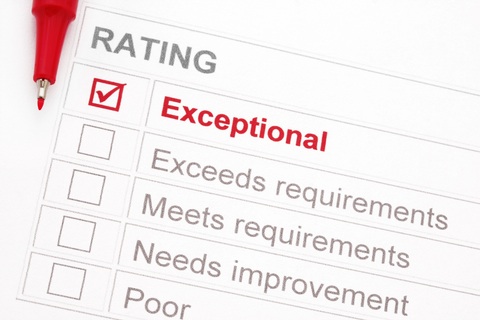One of the first questions I ask when I start working with a new client is, “Are you using performance appraisals well, and how does performance management work in your organization?” I guess that’s more than one question, isn’t it?
Once in a while I hear that performance management is working well, that appraisals are written and discussed, and that there’s a benefit to the dialogue. As I said, that’s once in a while. Unfortunately, too often there are cobwebs in the system.
A few years ago, when I was working for a community organization, I asked a similar question. I got answers like, “Oh yeah, we do them. I have my form.” When I asked what was learned from the performance review discussion, I received dark stares. As I probed deeper, Shannon, a brave employee, told me, “The CEO takes a pen and just draws a line down the page and marks every standard as excellent.” I thought, now that’s scary!
I found what Shannon told me incredible, so I asked Thomas, the CEO, about it. He confirmed that it was true. “What,” I asked, “was the purpose of having performance appraisals?” Thomas told me that the board of directors asks about performance appraisals, so he does them. He said it’s simple – he uses the form that he inherited and just fills it out and puts it in each employee’s file. He didn’t even plan on discussing them. Oh my! There are some serious skeletons hanging out in that organization’s closet!
As I started talking more with Thomas, I found out he “just didn’t have time” to write appraisals. Hearing that made me batty. Still, he told me all about his direct reports. What each employee was doing well, and what each had trouble managing. He talked for a long time and in great detail. I returned to my office and I wrote drafts for him. Neither one of us realized it, but we were starting a process that lasted over a decade. Every year, I would ask Thomas questions, and he would answer. In the end he would have a draft performance appraisal for each of his direct reports. Someone told me that I was “ghost writing” but I wasn’t really; I was just capturing and organizing his thoughts.
As a result of our work together, Thomas’ senior leadership team has had performance appraisals for the past 11 years. They discuss their goals, accomplishments, and challenges with Thomas at least once a year. The courageous conversations are happening. And, as you would guess, once Thomas started, it spread throughout the organization. The culture of the organization shifted.
If the words, “performance management” are just words, it’s time to take action.
Do you find the performance appraisal process in your organization to be helpful? Do you learn from it?
Performance appraisals can be either a trick or a treat. I hope yours will be both sweet and helpful.

Performance reviews can be an opportunity for individuals, departments and organizations to improve. The best performance reviews create a meaningful dialog between employees and managers. The process encourages a sharing of ideas, opinions and information – with no surprises or anxiety. Quality performance reviews are relaxed, two way conversations. If your reviews aren’t relaxed it may be because you and your manager don’t meet often enough to discuss how things are going.
Below are 10 benefits of Performance Reviews:
- Strengthens the relationship between the employee and manager.
- Provides an opportunity to appreciate the employee for their ongoing contribution and for the employee to appreciate the manager as well.
- Invites managers to express areas of strength.
- Focuses the manager’s attention on the employee without interruptions.
- Provides an opportunity for employees to ask for what they need (training, resources, support, etc.).
- Provides data for promotion, compensation, or corrective action.
- Identifies how the employee can be a more effective contributor.
- Identifies how the manager can support the employee.
- Creates a structure for the employee and manager to regularly connect on performance and goals.
- Provides a way to document performance to avoid legal actions.
In order to conduct an effective performance appraisal, ongoing coaching and feedback are needed throughout the year.
When was the last time you had an informal discussion with your employee about performance?
Yesterday, I was meeting with a senior manager – we’ll call him Saresh – and he was telling me about a problem he had with one of his employees, Chris. Saresh told me that Chris hadn’t been sharing information with the team.
Saresh also told me about a number of other small problems dating back months and years…As we talked I realized that there weren’t a few problems, but a lot of issues; and they weren’t small, some were rather big and impactful.
When I asked Saresh how Chris handled it when he gave him feedback, Saresh said that he hadn’t given much feedback. Saresh felt it was always better to give positive feedback, so he never commented on the things that were going wrong. Not surprisingly, the behavior and problems continued.
We talked about how important it was for Saresh to sit down with Chris and address the issues. He agreed to do just that, but I had forgotten to tell Saresh, “Just a few at a time. Don’t overwhelm.”
So, Saresh sat with Chris and he noted a lot of the problems – some dating back as far as two years prior. This, as you can imagine, led to a complete overload of information.
What went wrong?
Think of how a body needs to be nourished. We need healthy foods day in and day out. Our bodies benefit from moderation and consistency.
Feedback is just the same. Many employees are literally starving for feedback. They want the positive feedback, we can think of it as the dessert, and they also want the feedback that will help them grow, perhaps the veggies. Employees benefit from consistent feedback in small doses, just enough to ‘digest’. This is the type of feedback that they can apply to make changes and streamline and improve practices.
An overload of feedback in one sitting is like Thanksgiving dinner at my mother’s house. My body becomes overloaded and sluggish.
Have you even been overloaded or starved for feedback?

My wonderful husband cutting the turkey, confined to the laundry room because the turkey is so messy, and still smiling away!







